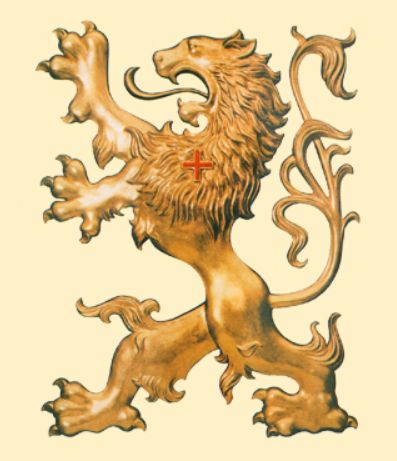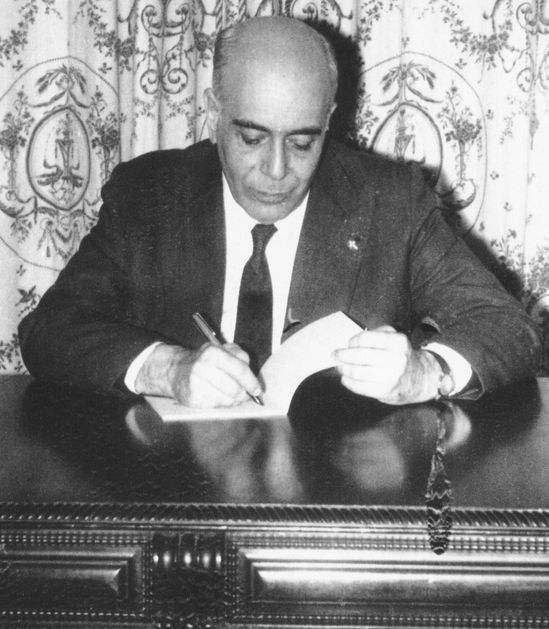|
Plinio Corręa de Oliveira
Letter
to a Friend
CRUSADE Magazine, November/December 2000, p. 13-15 (*) |
|
|
My dear friend, Salve Maria!
I read your letter with much interest. However, I must confess that I smiled at reading of your desire to be just like me. In all sincerity, let me tell you that it would profit you very little; and when I say this, you must believe that it is only because I wish the best for you that I do not wish you do become my carbon copy. God in His wisdom created each of us with a unique personality, and every man is called by God to realize his particular perfection. You must be faithful to the truth within you. It is only when each of us is faithful to the truth within ourselves that we can attain the greater truth within all. Philosophers and writers abound, yet there is only one factor that justifies the existence of one and the other: a passion for the truth. Without this passion, philosophies and books are mere vanities, perilous vanities that enkindle fire on earth and add fuel to the fire of hell. Because of our fallen nature, we find it difficult to surrender our worldly desires for the sake of the transcendent truth. Yet the man whose sole desire is to seek the truth renounces his own ideas without the slightest reservation. He willingly abandons the most intimate intuitions, the most intriguing contemplations, the most seductive theories, and the most ingenious systems, for the sake of upholding the truth. He will sacrifice the most exquisite aesthetic creations and the most uplifting intellectual conclusions and, ultimately, the most persuasive formulations in order to pursue the truth, unadorned and unadulterated. In sum, he prefers truth to career, fortune, fame, and even reputation. Truth, never much liked, is hated in our day. And why? Because truth is unchangeable, while man loves the endless spectacle of appearances. Truth is timeless, while man follows the fashion of the moment. Truth calls us to sacrifice, while we prefer to pursue pleasure. In short, truth is serious; while man is frivolous. Truth is strong; man is weak. Accordingly, the man who loves truth is hated by the world. He will be persecuted by those who would prostitute truth in order to satisfy their base appetites. While those men climb the ladder of literary fame and philosophical renown, the lover of truth may remain silent, awaiting the right opportunity to defend and proclaim the truth. You might say that rather than depicting the pursuit of philosophy, I am describing to you the path to sanctity, and you are right. I simply wish to point out that for those called to philosophical studies, spiritual perfection is rooted in a passion for truth. As Catholics, we know that truth is not only an epistemological or metaphysical question, but it is, above all, the Second Person of the Most Holy Trinity, the Word of God made flesh for our salvation. We may now address the questions you raised in your last letter. The intellectual life is intimately connected to the spiritual. There should be no division between your intellectual and spiritual life. Seek always to do God’s will and don’t worry about the future. Conscientiously fulfill the duties God has given you and trust in His Providence, for God is faithful to those who serve Him. Nevertheless, it is very true that God often tests our confidence. When He does, do not deceive yourself into believing that God has abandoned you. It is when all seems lost that the way out is closest at hand. Of course, you should not lose sight of the fact that this world is not your lasting home. Your true home lies in the world to come and is eternal. Accordingly, do not expect pat answers to every problem. Live by faith and place your confidence in God alone. Let your model of Christian life be Saint Peter walking by faith on the stormy seas and do not sink beneath the waves of despair. Just as there should be no division between your intellectual and spiritual life, there should be no discord between your thoughts and actions. Philosophy should not be treated as though it were a geometric theorem. In other words, the philosopher cannot place himself outside philosophy and view it with detachment. On the contrary, his life and destiny as well as the future of mankind are intimately joined in the course of philosophical questions. It is not sufficient for a philosopher to develop his intellect. He must also cultivate a rich and vigorous personality to better reflect the abundance of life. To broaden your vision and strengthen your personality, you should enrich your spirit through literary classics that express fundamental characteristics of the human soul. Virgil, Dante, Shakespeare, the French classics — their imperfections aside — ennoble men through the inspiration of their magnificence. You need not make a systematic study. Rather, choose the works you find most to your liking. Vary them. If you prefer reading a passage from one masterpiece today and a selection from another great work tomorrow — only make sure that you read them in their original. Follow the same path in contemplating great art and appreciating the music of the great masters, such as Bach or Handel. As for your philosophical studies, I can well appreciate your dissatisfaction with certain contemporary authors who pass themselves off as Thomists. Since they are neither authentic Thomists nor genuine philosophers, the best thing to do is to put their writings aside. They will only confuse your spirit and lead you down dangerous paths. As far as Maritain is concerned, he is but a vulgarizer whose literary flourishes are poor substitutes for serious substance. His disciples’ superficial mentalities seem easily satisfied with metaphysical musings that fail to stand up to rigorous analysis. I must confess that when I was your age I allowed myself to be seduced by his style as well. God, however, helped me to see with time, the hidden venom. Go directly to the source. Familiarize yourself with the writings of Saint Thomas. Do not be afraid; the Angelic Doctor is clearer than his commentators. Everything depends on getting used to his style and, what is more important, his discipline. This, however, will not be difficult, as long as you apply yourself with diligence and humility. To begin, I recommend Prima in the Summa and De Veritate. In Prima, put aside questions 2, 23, and 24. As for De Veritate, do not go beyond the third question. At the beginning , do not pursue a systematic study, but follow the same course as for literature, art, and music. If a text exceeds your understanding, seek another that is within your grasp. Remember that we are not yet learning Saint Thomas, but simply becoming familiar with his way of thinking. To this end, reflection is worth more than reading. Seek as much as possible to resolve problems yourself rather than seek prepackaged solutions. Above all, adhere to the text of Saint Thomas for the time being and forego his commentators’ notes. Above all, bear in mind that the true philosopher nourishes his thoughts with spiritual wisdom. The Spiritual Exercises of Saint Ignatius, complemented by the Imitation of Christ, provides a solid foundation. Again, read only the text — the original text — and avoid the commentaries. Also, as Catholic piety is fundamentally Marian, have at hand the excellent works of Saint Louis de Montfort — all of them, if possible. Having asked God to enlighten me before undertaking a task of such responsibility, I have endeavored to address the questions and problems you posed as best I could. You will certainly find many deficiencies in my response, but I am certain that God will compensate for them if you have recourse to Him. Above all, be calm and at peace. I sensed a certain agitation in your letter. Strive not to trouble yourself. Nervousness is the murky water in which the devil does his fishing. He is a master at irritating nerves and tormenting consciences by means of the imagination, suggestion, provocation, afflicting the body with physical sensations of uneasiness, insecurity, anguish, repugnance, rapid heartbeat, and much more. Do not allow any of this to cause you to despair. Look ahead into the merciful Hearts of Jesus and Mary and walk forward over the stormy seas of life with faith and confidence. Be assured that you shall not sink beneath the waves! Call on me at any time in any need. And please be so kind as to remember me in your prayers. Yours in Jesus and Mary,
[Plinio Corręa de Oliveira] [This letter has been translated and condensed from the personal correspondence of the author.] |
|



